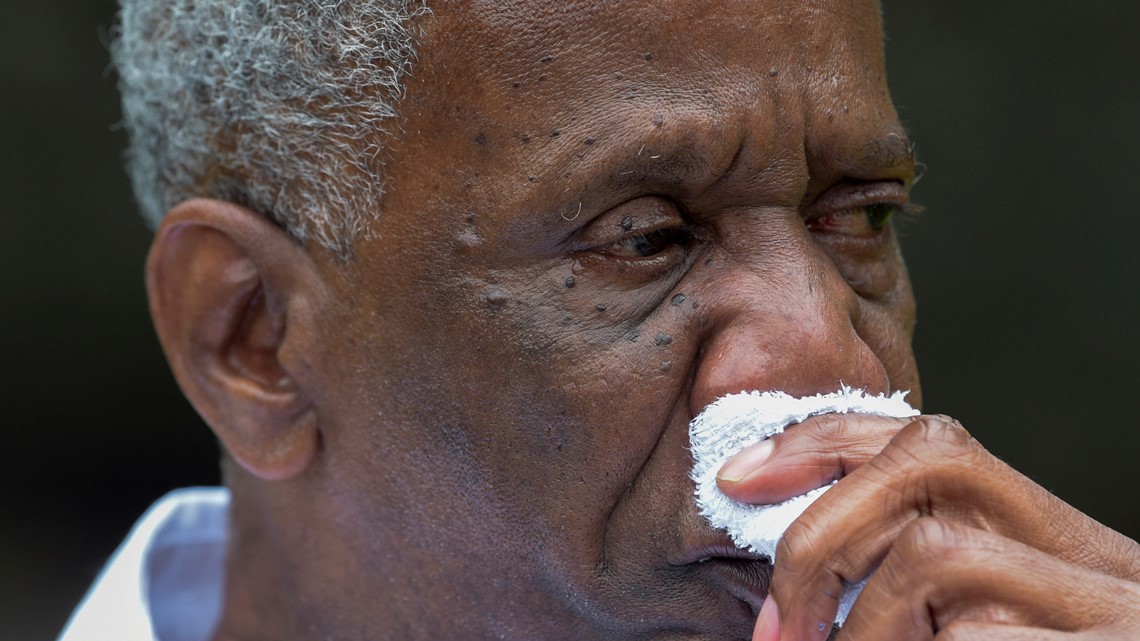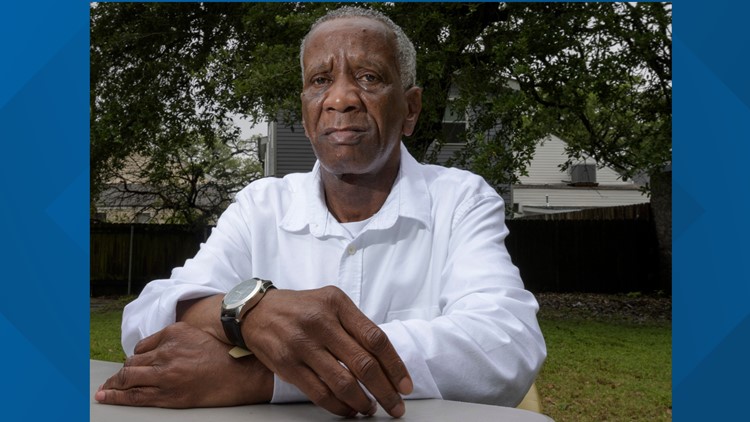NEW ORLEANS — Guy Frank wears a silver watch on his right arm. It’s a memento from his brother Joe, who died of cancer last April during Frank’s 20th year in prison.
The deaths mounted as Frank served a 23-year sentence for stealing two shirts from a Canal Street department store under Louisiana’s version of a “three strikes” law. The 11th and last relative to go was his father, who died weeks before Frank walked free on April 8.
“It hurt me to see these people die while I was in prison,” Frank said last Friday, his voice choking with emotion. “I can’t go back and get them out of the grave.”
Until this month, Frank was one of an untold number of people still imprisoned by a harsher era of criminal justice. But the 6th Ward native now has nearly three years of his life back, thanks to parallel projects from a non-profit law firm and the District Attorney’s Office to review and reverse old, unjust sentences.
At least six people from Orleans Parish serving life prison terms under the habitual offender statute have been freed so far during Jason Williams’ term, and prosecutors have filed a motion to remove the sentencing enhancement from another case, according to a review of state prison records. The District Attorney’s Office declined to give its own count.


Frank, 66, was freed early with the blessing of Williams’ office after a tough upbringing and a long journey through Louisiana’s prison system. He was one of seven boys and two girls who grew up in a family on Dumaine Street where “mom was the daddy and the mother,” Frank says. By the time of his arrest, he often stole store goods to support a heavy heroin habit.
But he never made it home with the shirts stolen from the Saks Fifth Avenue store on Canal Street in September 2000. Store security caught him, and with three prior felony convictions for theft, Frank was eligible for a much longer sentence as a “habitual offender” under Louisiana law.
Proponents say the law is aimed at punishing career criminals who have shown they cannot reform themselves.
Frank has long maintained that he had no idea what he was getting himself into when he pleaded guilty to felony theft. He initially received a 2-year sentence, but former District Attorney Harry Connick Sr.’s office invoked the habitual offender law, raising his minimum sentence to 20 years, and Orleans Parish Criminal District Court Judge Sharon Hunter went further to give him 23 years in prison.
Frank’s current attorney, Meredith Angelson of the Innocence Project New Orleans, says the entire system, including Frank’s court-appointed lawyer, failed him.
“Nobody ever offered a story of his life,” she said. “Nobody ever proposed drug treatment. They just told him to shut up.”
That’s essentially what appellate judges and a series of district attorneys told Frank for the next two decades, too. His appeals were rejected over and over.
The Louisiana Legislature has since softened the habitual offender law and sentences for non-violent offenses, but only going forward. A theft of under $500 would now be a misdemeanor, according to Angelson.
Meanwhile, former District Attorney Leon Cannizzaro agreed to release a number of prisoners serving time under the habitual offender law after a 2018 Louisiana Supreme Court decision applied some changes retroactively. However, Frank never filed a motion under that decision and his case went nowhere.
His luck changed this year thanks to Williams’ election and a new initiative from the Innocence Project New Orleans. As its name suggests, the group has long focused on freeing people it believes were wrongly convicted.
With a new “unjust punishment” project, the group is also training its resources on guilty people with disproportionate sentences. The project has won the release of seven people statewide since it began last year, Angelson said.
The non-profit’s initiative began before Williams was elected, but he is also pursuing a similar project using his power as a prosecutor.
Angelson said she was gobsmacked when she saw Frank’s sentence on a list of habitual offenders she received from the state Department of Public Safety. How could a man be serving 23 years for shoplifting? In a hastily-arranged video call with Frank, she confirmed the details.
She reached out to prosecutors under Williams, who quickly agreed to file a motion to remove Frank’s sentencing enhancement. Judge Benedict Williard agreed to set Frank free.
Angelson has already returned to the Orleans Parish Criminal District courthouse to secure another man’s release. Last week, prosecutors filed a motion to remove the sentencing enhancement of Emanuel Randall, who was serving a life sentence as a habitual offender on a 2009 conviction for possession of 0.12 grams of cocaine.
Orleans Parish Criminal District Court Judge Nandi Campbell resentenced Randall to time served last Thursday.
Unlike Frank, Randall had been convicted previously of a crime of violence, manslaughter. The appellate judges who upheld Randall’s sentence cited that conviction as the justification for his life without parole term.
In a statement, First Assistant District Attorney Bob White said prosecutors had once offered Randall, now 49, a 10-year plea agreement on the cocaine charge. It made no sense to keep Randall locked up any longer, he said.
“Mr. Randall’s prior crimes occurred when he was a young man or teenager,” White said. “Louisiana taxpayers would have paid around $700,000 from now until Mr. Randall died to keep him in prison to punish him for his drug addiction. This office believes that is inhumane and a waste of community resources that could be used for helping people who struggle with substance abuse to get the support they need for rehabilitation.”
Randall’s prior record points to some of the knotty issues that will confront the district attorney’s civil rights division as it surveys old sentences and considers requests from lawyers like Angelson.
Frank said the review is long overdue and gave thanks to Williams. He’s living with his sister in Mid-City, enjoying slow mornings and dreaming of becoming a church deacon. He knows the memories of everything he’s lost while he was in prison will come back to him, but he doesn’t want to focus on them.
“I just want to be happy,” he said.
► Get breaking news from your neighborhood delivered directly to you by downloading the FREE WWL-TV News app now in the IOS App Store or Google Play.



